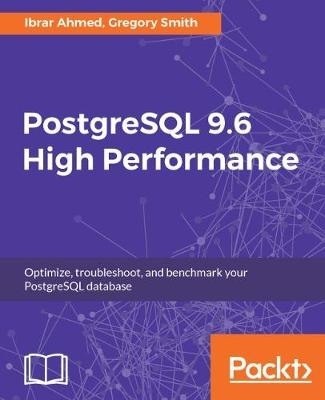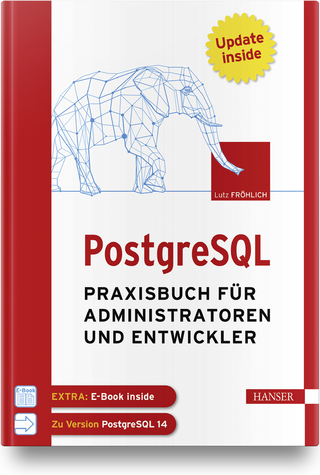
PostgreSQL 9.6 High Performance
Packt Publishing Limited (Verlag)
978-1-78439-297-0 (ISBN)
- Titel ist leider vergriffen;
keine Neuauflage - Artikel merken
About This Book
• Learn the right techniques to obtain optimal PostgreSQL database performance, ranging from initial design to routine maintenance
• Fine tune the performance of your queries and avoid the common pitfalls that can slow your system down
• Contains tips and tricks on scaling successful database installations, and ensuring a highly available PostgreSQL solution
Who This Book Is For
This book is for intermediate to advanced database administrators and developers who use or plan to exploit the features of PostgreSQL in the best possible manner. While administrators can benefit from the topics related to the installation, configuration, and optimization of the server, developers will learn how to write optimal queries and address performance issues in their database design. This book will also benefit the PostgreSQL internal architects in being able to monitor the performance using benchmarking tools.
What You Will Learn
• Learn the best practices to configure your PostgreSQL 9.6 database for optimal performance
• Write optimal queries and techniques to detect performance issue in queries
• Fine tune the performance of your queries using benchmarking and indexing techniques
• Ensure high performance and a highly available database using the scaling and replication techniques
• Discover how to make informed speed and reliability trade-offs
• Handle increasing database workloads without any hassle
• Use monitoring insights to continuously rework the design and configuration for best performance
In Detail
Database administrators and developers spend years learning techniques to configure their PostgreSQL database servers for optimal performance, mostly when they encounter performance issues. Scalability and high availability of the database solution is equally important these days. This book will show you how to configure new database installations and optimize existing database server installations using PostgreSQL 9.6.
You will start with the basic concepts of database performance, because all successful database applications are destined to eventually run into issues when scaling up their performance. You will not only learn to optimize your database and queries for optimal performance, but also detect the real performance bottlenecks using PostgreSQL tools and some external tools. Next, you will learn how to benchmark your hardware and tune your operating system. Optimize your queries against the database with the help of right indexes, and monitor every layer, ranging from hardware to queries. Moving on, you will see how connection pooling, caching, partitioning, and replication will help you handle increasing database workloads.
Achieving high database performance is not easy, but you can learn it by using the right guide—PostgreSQL 9.6 High Performance.
Style and approach
This book has been organized in such a manner that will help you understand basic PostgreSQL 9.6 performance tuning to advanced-level configuration. There are many real-world problems explained in this book and explained in clear language, because improving database performance requires an equal mix of understanding theoretical concepts and working through hands-on examples.
Ibrar Ahmed is a Senior Database System Architect in an Enterprise PostgreSQL company. Prior to coming to open source development, he had experience in software and embedded system development. He also possesses vast experience in open source development. He has contributed to the PostgreSQL community as well as other open source communities, such as the Google Chromium project. He is an open source evangelist, and his passion for open source development has enabled him to contribute a number of significant features to different open source communities. Ibrar has contributed significantly to the goal of making PostgreSQL a federated RDBMS. He has developed, and maintains, a number of PostgreSQL extensions that communicate with other RDBMS's, such as MySQL; NoSQL databases, such as MongoDB; and distributed file system, such as HDFS. He has authored another book, PostgreSQL Developer's Guide, for Packt Publishing. Gregory Smith is a Chief PostgreSQL Evangelist in Charleston, South Carolina, for Crunchy Data Solutions, Inc. He's been providing database advice to clients in industries such as manufacturing, finance, and web development for 20 years. Writing about PostgreSQL represents his second foray into teaching database performance tuning. He wrote a small free e-book titled, Progress Performance FAQ in 1995, covering the basics of how to make the Progress 4GL and its associated database run faster. In 2001, he converted exclusively to using PostgreSQL 7.0 for projects, and has been watching the complexity of problems the database is capable of solving increase with every release ever since. Greg has contributed feature additions to every PostgreSQL version since 8.3. He's also the creator of a growing set of add-on tools for the database, currently including pgtune, pgbench-tools, peg, and 2warm.
| Erscheinungsdatum | 03.06.2017 |
|---|---|
| Verlagsort | Birmingham |
| Sprache | englisch |
| Maße | 191 x 235 mm |
| Themenwelt | Informatik ► Datenbanken ► PostgreSQL |
| ISBN-10 | 1-78439-297-9 / 1784392979 |
| ISBN-13 | 978-1-78439-297-0 / 9781784392970 |
| Zustand | Neuware |
| Informationen gemäß Produktsicherheitsverordnung (GPSR) | |
| Haben Sie eine Frage zum Produkt? |
aus dem Bereich

